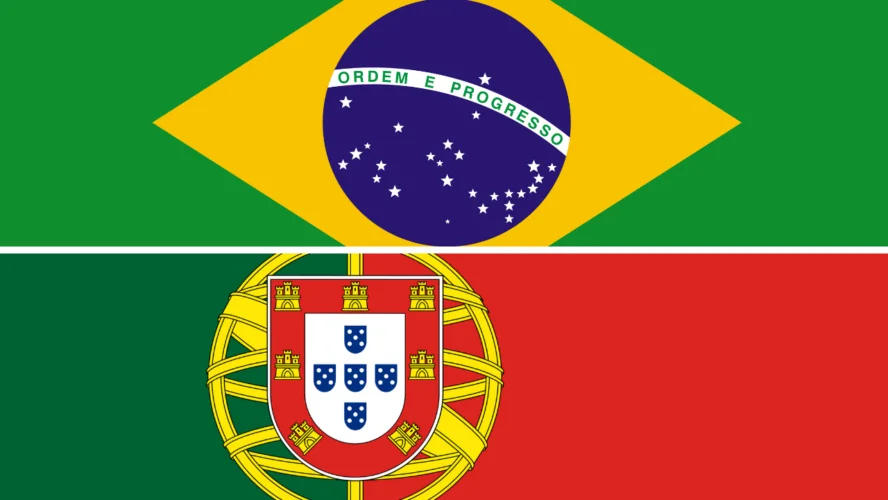TL;DR Summary
When I started learning Portuguese, I just listened and read things I enjoyed. At first, I didn’t understand much, but that didn’t matter. The rhythm and feel of the language grew on me. I’d look things up when I was curious, then get back to listening. Over time, it started to stick — as it always does when you stay with it.
***
Portuguese is one of the most widely spoken languages in the world with 250 million speakers on four continents. Portuguese is the official language in Portugal (clearly), Brazil, as well as six African countries and the Southeast Asian nation East Timor. I think Portuguese is a wonderful language and, having already learned Spanish, found the experience of learning it quite pleasant. In this post, I’ll share some thoughts and tips on how to learn Portuguese.
Is Tourist-Portuguese Enough?

An important initial question is to decide if you really want to learn Portuguese or simply get by as a tourist with a few phrases. If the goal is to visit a Portuguese-speaking country and have some basic, friendly interactions, you may just want to buy a phrasebook. Memorizing a handful of phrases can be useful, but don’t expect to understand much of what people are saying.
Understand that learning a language is a big undertaking that takes a good amount of time. Personally, just learning a few phrases really doesn’t do much for me. I wanted to really get into the language. There’s 200 million people in Brazil. Imagine the possibilities when visiting a beautiful country full of friendly people, capable of communicating in the language.
Free Portuguese Grammar Guide
I never like to put too much emphasis on learning grammar, but it can be useful to have an overview to reference every now and then. When diving into grammar, I suggest a resource that emphasizes examples instead of lengthy explanations and drills. For example, take a peek at LingQ’s free Portuguese Grammar guide. It’s simple, easy-to-read, and full of helpful examples.
Distinct Features of Portuguese
Generally speaking, there are a handful of grammatical features in Portuguese that are distinct from other Romance languages.
- Portuguese uses ter as its primary auxiliary verb in compound tenses, similar in use to haber (Spanish), avoir (French), or avere (Italian).
- Many high-frequency verbs in Portuguese are quite distinct from equivalents in other Romance languages. For example, “to think” isn’t penser (French), pensar (Spanish), or pensare (Italian), but achar.
- Portuguese has flexible verbs that can take on multiple meanings. For example, ficar can mean “to stay,” “to become,” or “to be located,” depending on context.
- Pronunciation includes nasal vowels (like mão or bom), which don’t exist in Spanish or Italian.
- The personal infinitive (para eles viajarem = “for them to travel”) is unique to Portuguese and adds flexibility in expression.
For those who already speak a Romance language, Portuguese is relatively approachable—but not automatic. You’ll need lots of input to build a natural feel for its rhythm and sound.
Understand Portuguese with LingQ’s Mini Stories
You will most likely not memorize or internalize grammar from the get-go. Therefore, you’ll need to develop a sense of intuition specific to Portuguese through immersion. I recommend browsing the library of material for Portuguese on LingQ. For beginners, I would start with the Portuguese Mini Stories, available in European and Brazilian Portuguese. The 62 stories about day-to-day situations feature the basic patterns of the Portuguese language and lots of repetition!
Which Dialect of Portuguese Should You Learn?

A common question among Portuguese learners is which dialect to prioritize. Should you learn Brazilian Portuguese? European Portuguese? Personally, I don’t think it really matters.
It’s good to expose yourself to a wide variety of accents, especially as a beginner. Portuguese pronunciation will differ between Brazil and Portugal, and you’ll benefit from familiarizing yourself with both. However, here are some practical distinctions.
- Brazilian Portuguese (BP)
-
-
Vowels are pronounced more clearly, which makes it easier for learners to understand.
-
Grammar is slightly more flexible in everyday spoken usage, especially when it comes to subject pronoun use.
-
Vocabulary includes words unique to Brazil, like ônibus (bus) vs. autocarro in Portugal.
-
- European Portuguese (EP)
-
Spoken EP tends to “swallow” vowels, which can be challenging for learners at first.
-
EP is generally considered more formal in tone, especially in professional and academic settings.
-
Exposure to EP helps with understanding African Portuguese dialects, which often align more with the European variant.
-
In short, if your main goal is communication, BP might feel more approachable, but both are valuable. The good news: learning one makes the other much more accessible.
How Hard is Portuguese?
So, is Portuguese hard to learn? It depends on your background.
-
If you already know Spanish, Italian, or French, Portuguese will feel familiar. Shared vocabulary and grammar patterns mean you can progress faster.
-
The biggest challenges are pronunciation (especially nasal vowels and intonation) and listening comprehension, since native speakers often speak quickly and drop sounds.
-
Compared to non-Romance languages (like Japanese, Korean, or Arabic), Portuguese is much more straightforward for English and European language speakers.
In short: Portuguese, like any language, is doable with consistent practice and interesting input. If you’re an English speaker or have knowledge of another Romance language, you’ll be able to progress quite quickly.
Treat Portuguese as its Own Language
Perhaps this seems obvious, but there are a large number of Portuguese learners who speak another Romance language. If this applies to you, I insist that you will have to change your habits. Spanish and Portuguese, for example, are so similar that we may think we can just pick up a few Portuguese phrases and fake it. However, this is not going to work.
When I first started learning Portuguese (before LingQ), I wasted a lot of time trying to just pick up the few words and structures in which Portuguese differed from Spanish. When I went to Portugal, I depended on my Spanish to “wing it”. Even though I studied Portuguese for 2-3 months, I wasn’t able to speak well at all, and I didn’t easily understand what people were saying.
Portuguese deserves to be treated as its own language. Immerse yourself, notice patterns, and give it the attention it needs.
Always Learn From Interesting Content

I decided to really engage with Portuguese when I found more interesting content. I studied with a LingQ tutor in Brazil, Ana Paula, from Belo Horizonte, who created a lot of content about her life in Brazil. Her content consisted mostly of spontaneous monologues that were transcribed after the fact.
We also got permission to use podcasts from Café Brasil on LingQ, and I also found a handful of other wonderful podcasts from Portugal. I was immersing myself in Brazilian and European Portuguese, and the amount of time I spent listening and reading increased. I found what interested me in Portuguese, and that’s when my progress really took off. You’ll develop a stronger understanding of the language with vast amounts of listening and reading.
Final Thoughts: What Motivates You to Learn Portuguese?
The main tip I have on learning a language is, first of all, get motivated. Every person has to discover the language on their own and stay with it until they achieve their goal. Strive to immerse yourself in the language with reading and listening. Align your studies with your personal interests, as you’ll be more likely to engage with the language consistently and with greater intensity.
Remember: set attainable daily goals. Just like committing to 30 minutes of exercise a day, dedicating even a short but consistent block of time to Portuguese will help you stay motivated and build momentum.
Eventually, you’ll acquire lots of words, you’ll develop a strong grasp of the language and its patterns, and you’ll find that speaking skills appear pretty naturally. With a strong base in the language, you are now ready to interact with the very sociable Brazilians, or the somewhat more reserved but polite and gentle Portuguese!
FAQs
Is Portuguese hard to learn?
Not particularly, especially if you already know Spanish or another Romance language. The main challenges are pronunciation and listening comprehension, but with practice, this becomes easier.
Is Portuguese similar to Spanish?
Yes. Portuguese and Spanish share a lot of vocabulary and grammar. However, they are distinct languages and each require a certain amount of attention and immersion.
Why should you learn Portuguese?
This is ultimately up to you. However, there are plenty of reasons to learn Portuguese. There are over 250 million speakers worldwide. Portuguese opens doors to Brazil, Portugal, Africa, and beyond. It’s also a beautiful, expressive language that connects you with rich cultures and literatures.
How long does it take to learn Portuguese?
This depends on your background and consistency. Spanish speakers may reach conversational fluency in a few months, while English speakers might need 8–12 months of consistent practice.
What is the best app for learning Portuguese?
LingQ is one of the best tools because it lets you learn directly from interesting, authentic content. Other popular options include Duolingo, Memrise, and Pimsleur.



15 comments on “How To Learn Portuguese”
Comments are closed.
I believe you meant “ter” (pt) instead of “tener” (es).
That’s right, the correct conjugation is “ter”, not “tener”.
I’ve even trying to learn portuguese for 2 years and 10 months and it’s the most frustrating thing I’ve ever done in my life. I’ve been to Brasil 12 times now and my girlfriend lives there. I can only say a few things like you mentioned. Hello good bye please and thank you. I can order water and say a few other things. My girlfriend only peaks English with me because I can’t speak Portuguese and it’s very frustrating. We were never taught much English grammar terms in school so I don’t understand much like “infinitive, subjunctive, preposition, articles” or any of that which makes it difficult when reading rules in books. What can I do? The more I try the more confusion it seems to create. Thanks! Pat
@Steve: Great article! Portuguese is a beautiful language. I recently moved to Lisbon and I’m trying to switch from the Brazilian form that I learned to the European form that I want to speak now.
Re: this sentence:
**They use ‘tu’ the singular form in Portugal; in Brazil they mostly only use the “Voce”, which is the third person for ‘you’.**
Você is not the third person for you. You is always the second person. Você is a formal form of the second person singular in Portugal but is the informal form of the second person singular in Brazil. It takes the same conjugation as the third person singular (ele/ela – he/she), but it is not the third person itself.
@Patrick: It’s true that in your native language, you don’t need to learn or know grammar. But it’s obviously very helpful when learning foreign languages. Maybe you should become more familiar with English grammar first and then apply that knowledge to Portuguese. In answer to your specific terms:
infinitive: the full form of the verb, unconjugated. So an English example of an infinitive is ‘to speak’. The Portuguese equivalent is ‘falar’. Within the verb falar, there are many other forms, e.g. ‘eu falo’ is ‘I speak’. But falar is the infinitive form.
subjunctive: a verb tense especially prevalent in the Romance languages such as Portuguese and one that is related to uncertainty or doubt. We don’t really have it in English (although it does exist in some minor forms such as ‘I recommend that he go there’ (i.e. not ‘goes’, as it usually is after he). In Portuguese the various subjunctive forms can follow trigger words like ‘que’ and ‘se’. At the level you’re at, the subjunctive is not important because you will be understood without it, but learning a set phrase or two with the subjunctive can be helpful, e.g. to say ‘if you want’ in Portuguese uses the subjunctive: ‘se você quiser’, rather than the indicative (standard) ‘se você quer’.
prepositions: my non-academic definition is ‘little words’. Things like on, in, by, under, etc. They are used to form phrases and give context (often spatial, e.g. ‘on the fridge’ and ‘in the fridge’ mean different things).
articles: there are two forms in English: the definite article (the) and the indefinite article (a, an). The Portuguese equivalents are o/a (and plurals os/as) for the definite article and um/uma for the indefinite article. The definite article is when there is only one of something (.e.g ‘the sun’, not ‘a sun’) or when it’s very clear that you’re talking about a specific unit. So if you have a dog, you would say, “I’m going to walk the dog,” because it’s obvious that you can only be referring to the specific dog that is your pet. But in another context you might say, ‘I’m going to buy a dog,’ because it’s not clear exactly which dog you’re talking about.
Boa sorte!
Thanks a lot Nick, I’m still working on it but haven’t had a conversation yet which is frustrating after 3 years and 8 months of studying and 13 trips to Brasil. Understanding spoken Portugues for me is like trying to wash a car as it drives by on the freeway, way too fast! I found a friend that doesn’t speak English to practice with every day so I hope that helps. I’m still having to translate because I can’t understand much written or spoken. My brain is stuck on English and wont switch to Portuguese I think. My teacher says my pronunciation is perfect so tjete is something positive. Thanks for the help! Pat
Hi Pat! Sorry your having troubles. I’m learning Portuguese too. I haven’t been to Brazil yet, but I joined a Portuguese speaking church in my hometown. I was very lucky to find it. I have noticed though that language habits form very quickly with different people…one of my friends speaks Portuguese to me and I have the bad habit of answering her in English. The easiest people to talk to are the ones that don’t speak any English. Then I have to use Portuguese. But I totally understand the silent frustration having a native Portuguese speaker talking to you in English and you are too tongue tied to say something in Portuguese and your hoping and praying they will change to Portuguese! As far as grammer goes, I barely know what an adjective is! I read alot of Portuguese everyday and somehow it helps me understand spoken Portuguese better. I have spent 1-2 hours everyday for the last 400 days watching Portuguese videos on youtube. I watch the news, documentaries etc with the Portuguese closed captions on. Its helped tremendously. The better I understand what people say, the better I can speak. Language learning has the lowest lows and the highest highs. This is the first foreign language I’ve tried to learn. Seasoned veterans like Steve have great advice. He doesn’t panic even when he temporarily forgets an entire language!
Thanks! I have found a few friends that help me and speak Portugues with me but I haven’t been able to have a conversation yet after studying 3 years and 8 months and 13 trips to Brasil so it’s frustrating. They speak too fast for me to make out what they are saying and to be able to translate it because I can’t understand enough yet to know what is happening.
Hello! I am here in Brasil for the 14th time and still can’t converse or understand what people are saying. It’s frustrating after studying for 4 years and 3 months. The woman I’m visiting can’t speak English but she is learning it faster than I’m learning Portuguese. I have to use a translator. I will keep trying though. I ordered food and water. Um coxinha e duas águas. Any ideas?
The problem is that your girlfriend speak in English with you. You need get your brain and dive it on Portuguese Language. Forget grammar, just speak.
Exactly! She accidentally sent me a message in Portugues that was meant for another guy so it takes care of that problem. I have a nice Brasilian lady that speaks Portugues with me every day now. Thanks
Hello, I am fluent in Portuguese and would like to learn English, if you have someone interested, you can contract through my email rgoliveira1441973@gmail.com. Thank you!
Bom saber que tem gringos querendo aprender portugues. Haha
Good to know there are so many people interested about learning portuguese.
For the ones who wonder if they should focus on Brazilian or European Portuguese, I would recommend the Brazilian for some reasons: 1 – around 200 million people speaking (higher chances of you having to talk to a brazilian than to a portuguese person); 2 – when it comes to international content on internet, sometimes you find the translation to brazilian portuguese and not to Portugal´s portuguese (maybe because of the size of the population); 3 – I don´t know if I´m right, but brazilian portuguese seems a little more flexible as we have influences of other languages in our modern vocabulary.
I am an English Speaker planning to move into a Portuguese speaking country, with unfortunately no clue on the Portuguese language. Kindly help with hints on how best I can handle the language issue when I set foot in that country.
I would also recommend Brazilian version instead of Porugal, you will not have a problem to speak in Portugal and it is easier.